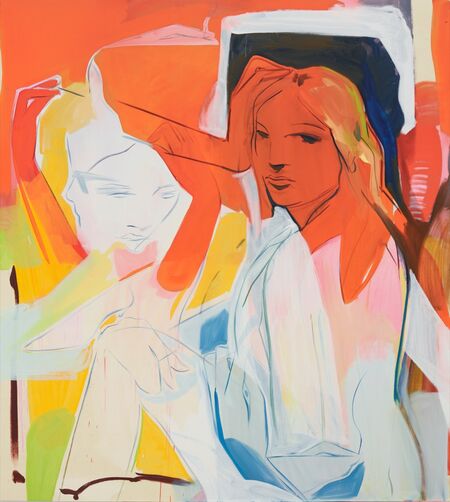
France-Lise McGurn, 90s mirror, 2023. Photo by Ollie Hammick. Courtesy of the artist and Margot Samel.
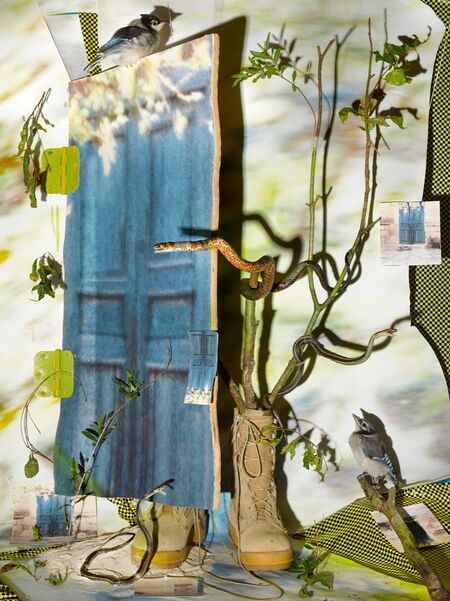
Sheida Soleimani, Behind the Door, 2022. Courtesy of the artist and Denny Gallery.
September marks the start of the busy fall schedule for the art industry. In New York, collectors, curators, and dealers descend on the city for the ever-growing list of fairs. Mostly taking place the second weekend in September—with VIP previews on the 6th and 7th, depending on the event—the roster of fairs is centered on the heavy-hitting Armory Show, which returns this year to the Javits Center alongside the New York debut of PHOTOFAIRS. Joining these are Art on Paper, the beloved artist-forward SPRING/BREAK, and the latest edition of Independent dedicated to 20th-century art.
The Armory Show is also staging public installations across the city, from Times Square to Astor Place to the U.S. Open. A highlight of the latter is Zizipho Powsa’s bronze sculpture Mam’uNoBongile (2023), presented by Cape Town–based gallery Southern Guild. Inspired by the artist’s Xhosa spirituality and traditions, the piece pays homage to the women in Poswa’s community.
As the fairs draw international audiences of industry leaders, September presents local galleries with an opportunity to showcase their best established and emerging artists. Following a summer of now-typical group shows, many galleries are opting this September for the solo and two-person formats that provide deeper looks into artists’ practices. From conceptual investigations of natural forces to a particularly strong selection of female figurative painters, artists across the city are offering their personal reflections on some of the experiences that connect us all.
Here are 10 standout shows on view during Armory Week.
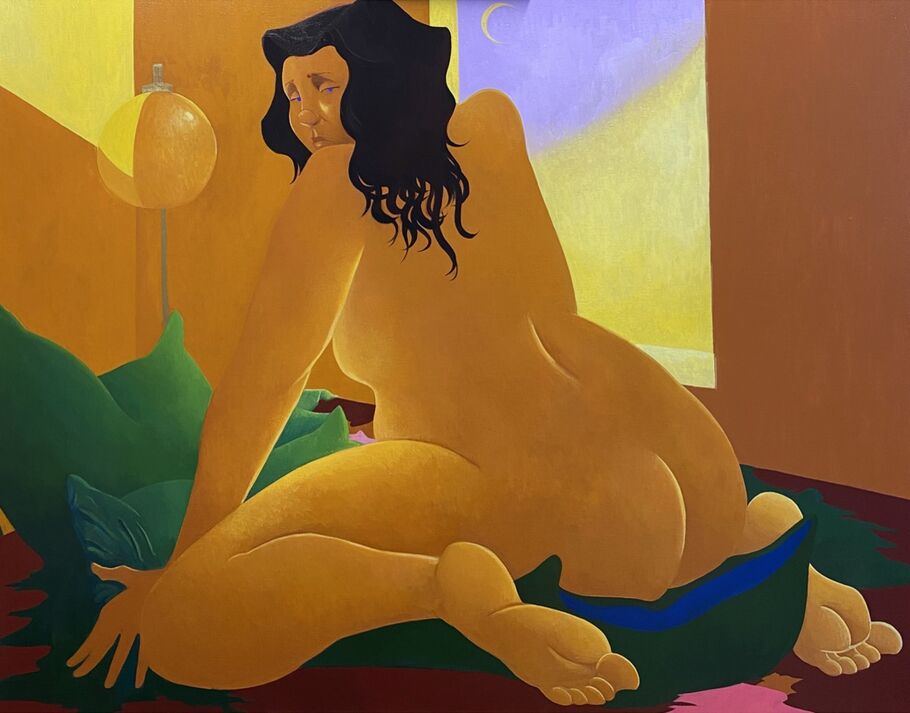
Natalie Terenzini, Lonely with Pillow, 2023. Courtesy of Thierry Goldberg Gallery and the artist
Using her own likeness as an alter ego, Natalie Terenzini navigates the complexities of femininity, embracing her discomfort, awkwardness, and vulnerabilities. In richly colored paintings, Terenzini depicts this character in nude and semi-nude states as she engages in candid scenes layered with emotion. She is often on the brink of transformation—nearing tears, having sex, finishing the last puffs of a cigarette—offering an unwavering glimpse into the emotional and physical weight of the in-between moments and nuances of the female experience.
Terenzini’s paintings in “As Good As It Gets” center on the complexities of yearning, a state that can lead to disappointment or fulfillment, or perhaps a mix of both. Each piece seems to capture a specific formative episode in the larger story of the character’s life. The figures’ expressions range from expectant and lustful to melancholic and frustrated. All are earnest and bear their emotions with raw intensity, inviting the audience to relate on a human level. In some, the character looks directly at the viewer as if exposed and self-aware, but also empathetic, reminding the viewer of the awkward, uncomfortable, and charged moments in their own lives.
Joe Fig, “Contemplating Compositions”
Cristin Tierney
Sep. 8–Oct. 21
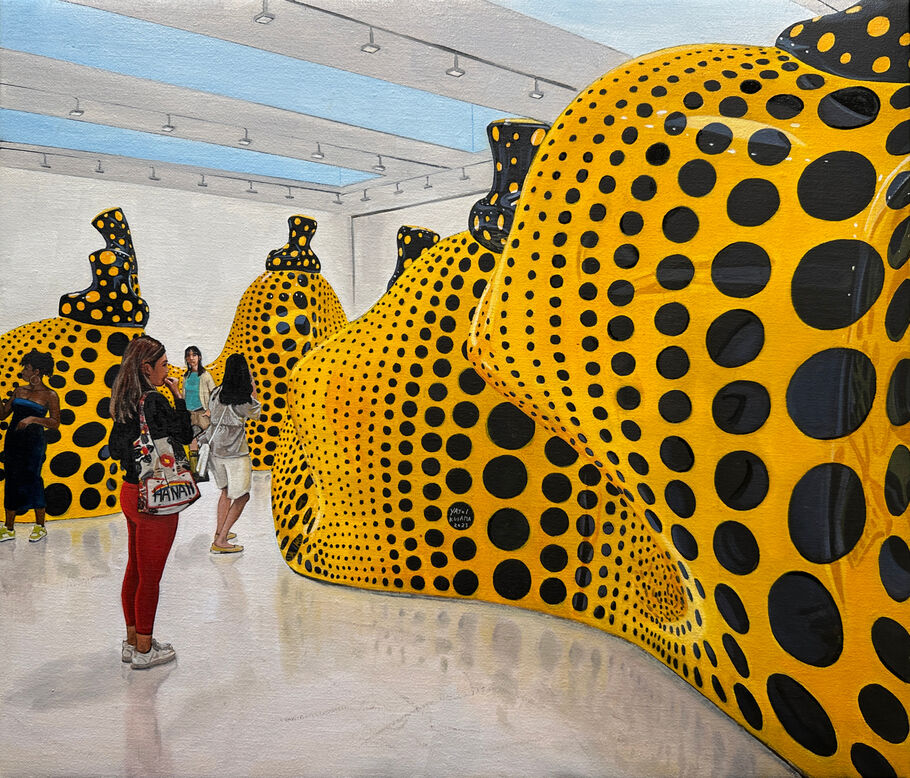
In “Contemplating Compositions,” Joe Fig humorously flips the artwork-viewer relationship, as his subjects are everyday people visiting museums and galleries. Capturing them in candid moments as they engage with paintings, sculptures, and installations, Fig’s work acts as both an ethnographic study of human behavior, as well as a chronicle of recent exhibitions.
The paintings in the show build on nearly a decade of such works in which Fig travels across the country, documenting exhibitions as both a visitor and an artist. In some, his subjects are engrossed in the artworks they observe, such as the viewers staring in awe at a monumental Marilyn Minter painting. In others, interest wanes as people gaze into the distance or lean precariously over the edge of the railing in the iconic spiral of the Guggenheim, seemingly unfazed by the blockbuster Alex Katz show that surrounds them.
Throughout the series, Fig depicts some of the biggest names in modern and contemporary art with recognizable works emblematic of each practice: from Yayoi Kusama’s pumpkins and Andy Warhol’s self-portraits to Brice Marden’s wavy abstractions.

Carlos Motta with Elio Miraña, ELO, Gil Farekatde Maribba, Higinio Bautista, Kiyedekago, Rosita, and Yoí nanegü, Jjagɨyɨ: Air of Life, 2023. Courtesy of Carlos Motta and P·P·O·W, New York
For two decades, artist Carlos Motta has produced thoughtful, carefully researched multimedia and collaborative installations that highlight repressed histories, including the ongoing ramifications of colonialism through the lived experiences of marginalized people. Working closely with Indigenous cultural leaders in the Colombian Amazon, Motta’s newest body of work in “Jjagɨyɨ: Air of Life” examines the loss of intersectional, cultural knowledge as a result of Capuchin Missions and the schools they created in the area.
The exhibition features the artist’s collaborations with Elio Miraña, ELO, Gil Farekatde Maribba, Higinio Bautista, Kiyedekago, Rosita, and Yoí nanegü, who are all artists, musicians, leaders, and craftspeople exploring and preserving Indigenous traditions. The show includes wood sculptures, paper and cardboard installations, audio pieces, and video footage documenting firsthand experiences of ongoing cultural erasure. Through these artistic interventions, Motta and his collaborators fight for the survival of Indigenous traditions, underscoring both what has been lost and what remains.
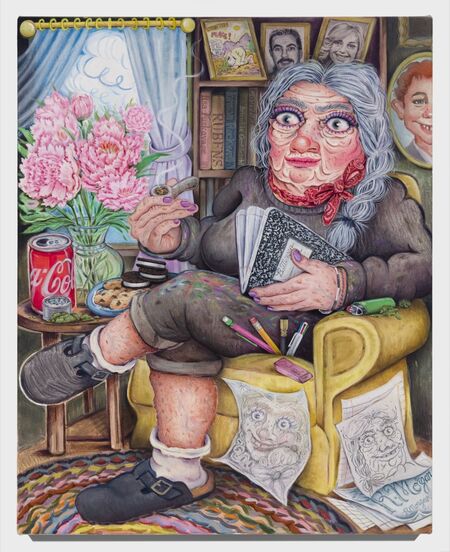
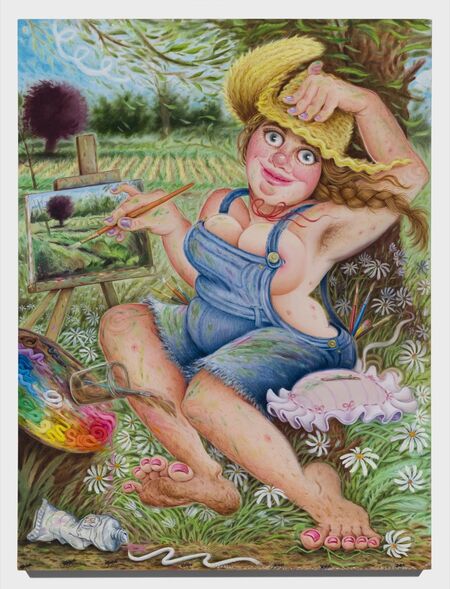
Rebecca Morgan, Self-Portrait as a Romanticized Painter, 2023, oil on linen.Photo by Etienne Frossard. Courtesy Asya Geisberg Gallery and the artist.
Cartoonish, whimsical figures abound in “Over the Hill,” Rebecca Morgan’s fifth solo show with Asya Geisberg Gallery. Featuring several self-portraits, the exhibition offers a glimpse into the artist’s life as she faces major milestones: the metaphorical hill of approaching 40, and the literal hills that have surrounded her since moving to the Hudson Valley in June 2022.
Hints of the latter theme emerge in Hudson Valley Plein Air (May 12, 2023) (2023), which nods to the legacy of landscape painters who admired the natural beauty of the region. Inserting herself into this history, Morgan is seen painting en plein air in Self-Portrait as a Romanticized Painter (2023). A small image of Hudson Valley Plein Air (May 12, 2023) appears on her easel as if documenting her artmaking practice.
Indeed, the entire show depicts the artist at different stages of the exhibition process, beginning with her frazzled self-depiction in Self-Portrait on the First Day of Summer Break (First Day of Making This Show) (2023). Elsewhere, she looks to the future in another self portrait at age 100, which includes a small cartoon that reads: “What does it all mean?”
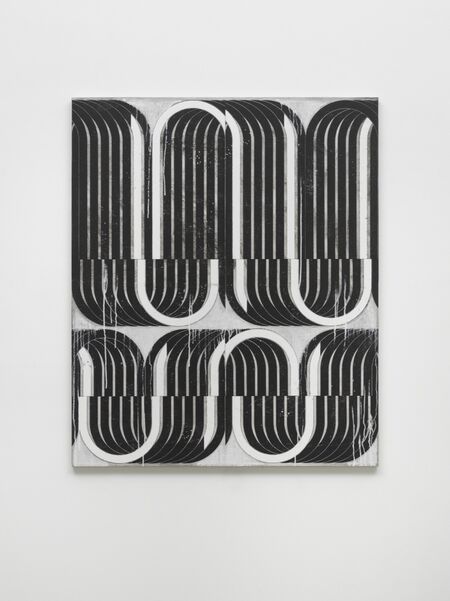
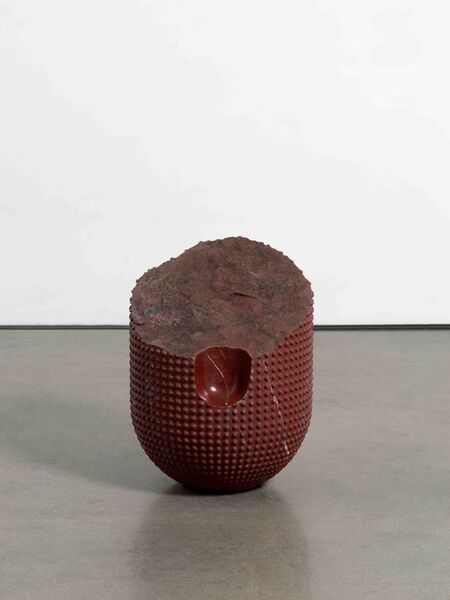
Davide Balliano, UNTITLED_Rosso Laguna 1, 2023 . Photo by Dario Lasagni. Courtesy of Tina Kim Gallery.
With sculptures and textured paintings made of plaster, gesso, and varnish, Davide Balliano explores the boundaries of perception. “Event Horizon” features new marble works that use the arch and undulating U-shapes that the artist has become known for. These sculptures remove the shape from the seemingly endless waves of patterns in his paintings, isolating the form with single and double arches that explore voids and negative space.
In his new paintings, Balliano returns to geometric abstractions on a larger scale, creating immersive fields out of his monochromatic and black-and-white patterns that he purposefully interrupts with broken circles and arches. In both bodies of work, Balliano brings the viewer’s attention to his materials. He leaves visible glimpses of natural, rough marble and thick drips of paint. In doing so, he pays homage to his Italian heritage and the use of marble in antiquities and architecture while also preserving evidence of his own hand and the effects of gravity acting upon the paint, offering visual cues of unseen natural forces.
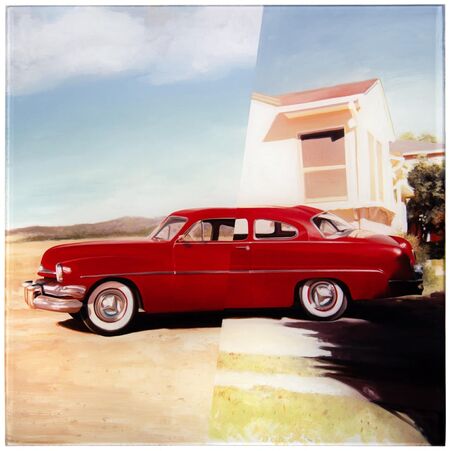
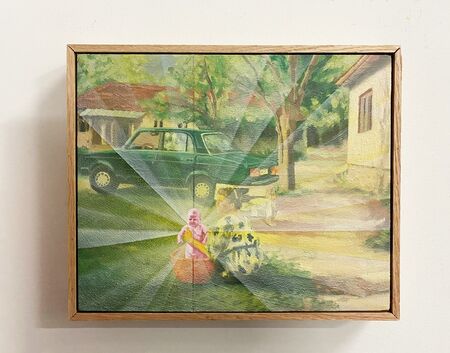
In “Recall,” Jessica Frances Grégoire Lancaster and Pajtim Osmanaj explore the ways that memories form our understanding of self, despite their tenuous nature. Both artists paint from photographs—Lancaster using pictures featuring strangers, and Osmanaj working from his family archive—that they reimagine, inserting their own voices in depictions of the past.
Though her subjects are unknown, Lancaster chooses images of everyday life with minimal context, allowing for broad interpretations that evoke a sense of familiarity. In Goodnight Idols (2023), she homes in on a tender moment between two figures represented only by their intertwining legs and boots. In Recall (2023), meanwhile, Lancaster combines two views of a red vintage car in different settings, perhaps conveying a journey or the passage of time. Mirroring the process of recalling a memory, she paints in reverse on glass, starting with the details and filling in the background.
Taking a more personal approach to reconfiguring memory, Osmanaj works from family photographs. Sometimes changing specific details, such as removing figures and placing them into different settings, he alters the timeline of his own narrative. He then airbrushes a veil of radiating light over his compositions, adding a dreamlike quality that echoes a clouded memory.
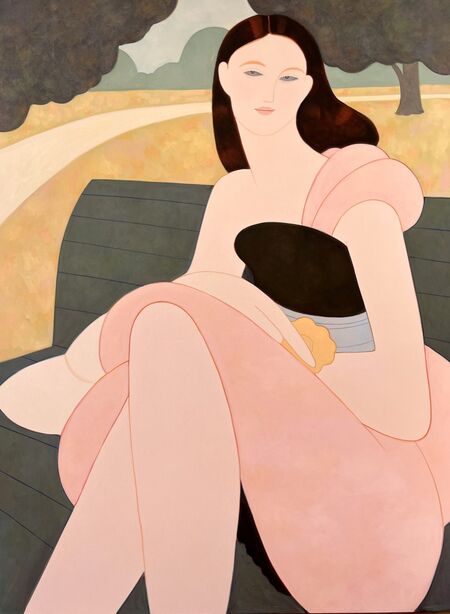
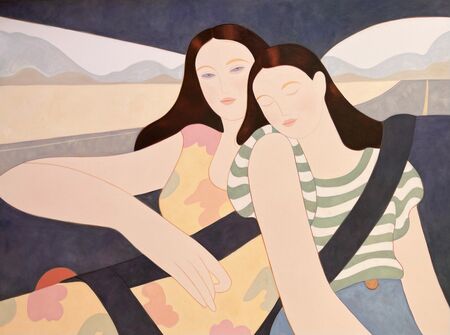
As the final moments of summer pass by, Kelly Beeman reflects on some of the everyday events that define the hot, lazy days of the season in new paintings, drawings, and watercolors. In the self-taught artist’s first solo show with Perrotin in its New York space, she depicts young people—mainly the same young girl with long, brown hair—enjoying summertime activities that evoke childhood innocence and nostalgia.
In muted colors and simplified lines, the figures pause on a park bench, stroll past a group of pink flamingos, and rest in the backseat of a car. They wear distinct outfits, from long dresses to patterned shirts, a common theme in Beeman’s work that reflects her own interest in fashion. Their expressions are relaxed but pleasant, as if embracing the hazy lull of the slow days. Offering few visual cues to identify her subjects, Beeman leaves the message up to the viewers and invites them to make their own narrative and personal connections to summer.
Tariku Shiferaw, “Marking Oneself in Dark Places”
Galerie Lelong & Co.
Sep. 7–Oct. 21
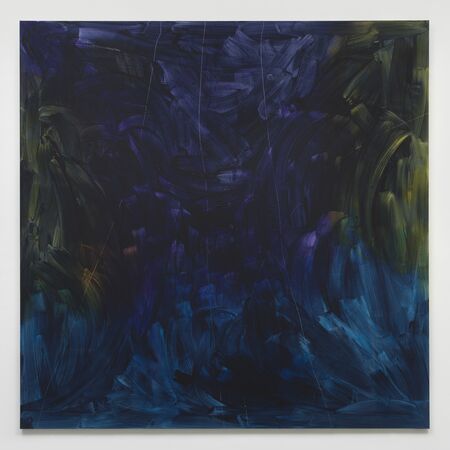
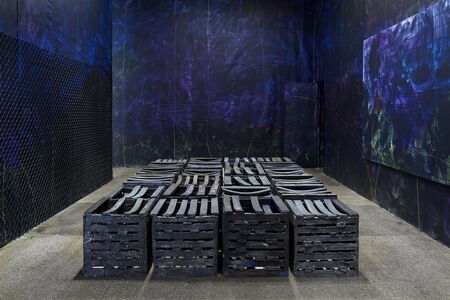
For his latest solo show with Galerie Lelong & Co., Tariku Shiferaw (who was featured in the 2021 edition of The Artsy Vanguard) is continuing his investigation of hierarchical systems and the exclusionary structure of the Western arts and cultural sectors. Through geometric abstractions and dense layering of materials, he explores markmaking and the long history of humans leaving evidence of their own existence as a form of self-declaration.
“Marking Oneself in Dark Places” includes new paintings and an installation that transforms the space of the gallery. For the latter, entitled A Sign in Space (2023), Shiferaw draws inspiration from Italo Calvino’s Cosmicomics (1965): 12 short stories that build narratives around scientific facts to chronicle the history and evolution of the universe. A Sign in Space focuses on a being that becomes fixated on making a mark to show his presence in the expansive, revolving universe. Shiferaw’s cosmic installation includes paintings, ceramic sculptures, and an audio component that imagines the night sky with sounds representative of the African diaspora.
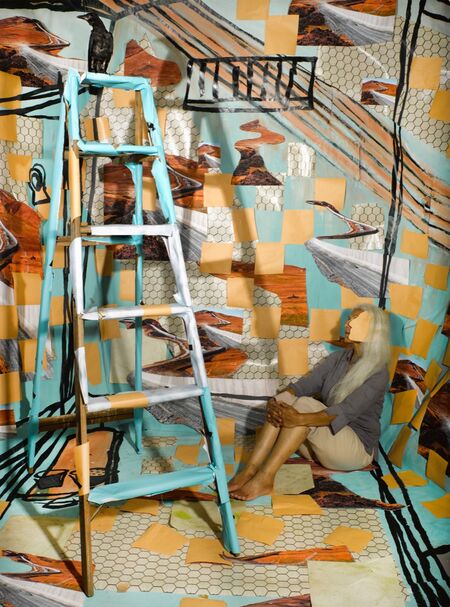
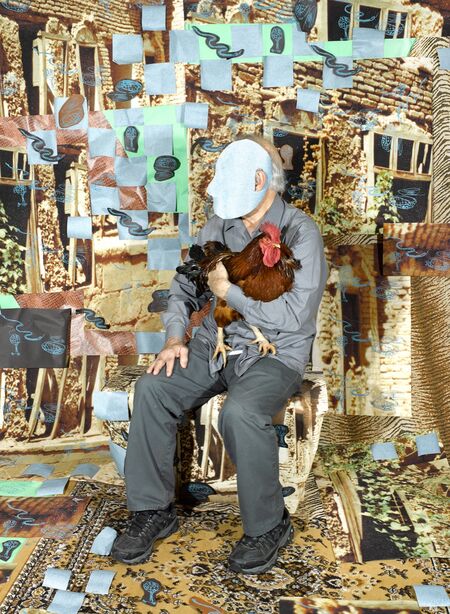
Using humor and satire in photographic assemblage, Sheida Soleimani highlights overlooked, misconstrued, and difficult themes that shape the human experience, examining in particular media representation of global issues.
In “Birds of Passage,” Soleimani turns the lens onto her parents, “ghostwriting” their lives to engage collective social issues through personal narrative. She layers memories informed by her parents’ stories of the 1979 Iranian Revolution and their experiences of finding refuge in Europe and the U.S. Imagining her parents in different scenarios, Soleimani speaks to broader issues facing oppressed and marginalized groups and how the repercussions of trauma unite individuals as they learn to cope, survive, and care for one another.
Reflecting the fragmented nature of memory and storytelling, as well as the biases inherent in historical narratives, Soleimani’s images resemble dreamlike episodes full of unexpected objects, pops of color, and symbols, such as the snake that appears often and alludes to the South Asian and Persian survival game of “snakes and ladders.” In rewriting her parents’ history, Soleimani draws attention to their pain and duress, as well as their resourcefulness, to honor their legacy and recognize broader stories of survival.
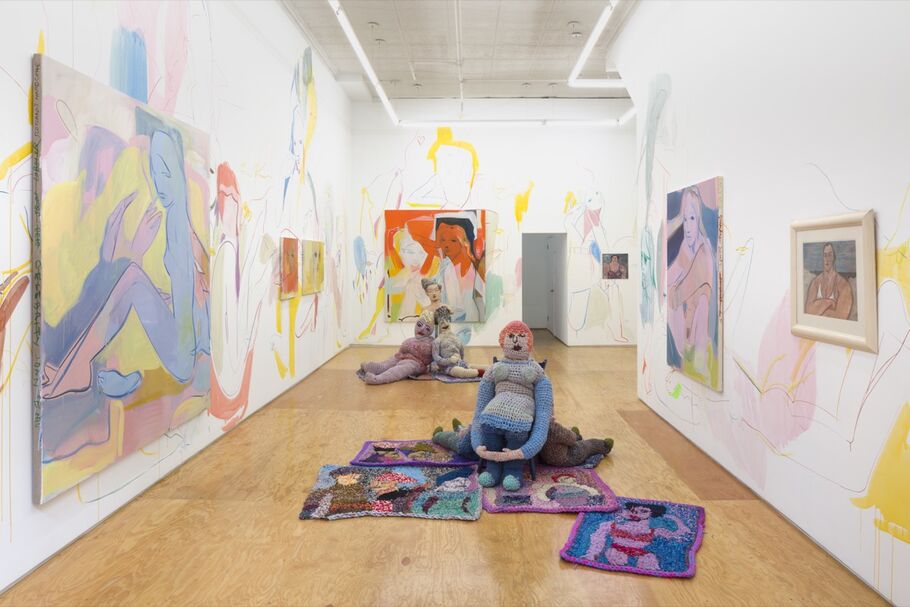
In “Matching Mother/Daughter Tattoos,” France-Lise McGurn considers the complexity of her relationship with her mother, the late Rita McGurn. The exhibition title draws inspiration from France-Lise’s experience of getting a tattoo that resembled Rita’s, to which the elder McGurn responded with derision, “matching mother daughter tattoos? Charming.”
An artist and set designer, Rita developed an eclectic body of painting and textiles, including woven sculptures of cartoonish figures and rugs, which surround them in the show. While not widely exhibited during her lifetime, Rita’s work filled the home that France-Lise grew up in, informing her understanding of visual and material culture as she established her own painting practice.
Exhibited alongside Rita’s work are new paintings by France-Lise. While best known as a figurative artist, the younger McGurn uses fluid, spare brushstrokes and minimal colors for her relaxed, ethereal subjects. With overlapping limbs and bodies fading into space, France-Lise’s unconstrained figures exude sensual energy. Mirroring the figures spilling onto the rugs surrounding Rita’s sculptures, France-Lise has created a site-specific wall mural with a parade of bodies enveloping the gallery. The exhibition offers an intimate look at the two practices, shedding light on the similarities and differences and inviting the viewer to consider the nuances of mother-daughter relationships.

